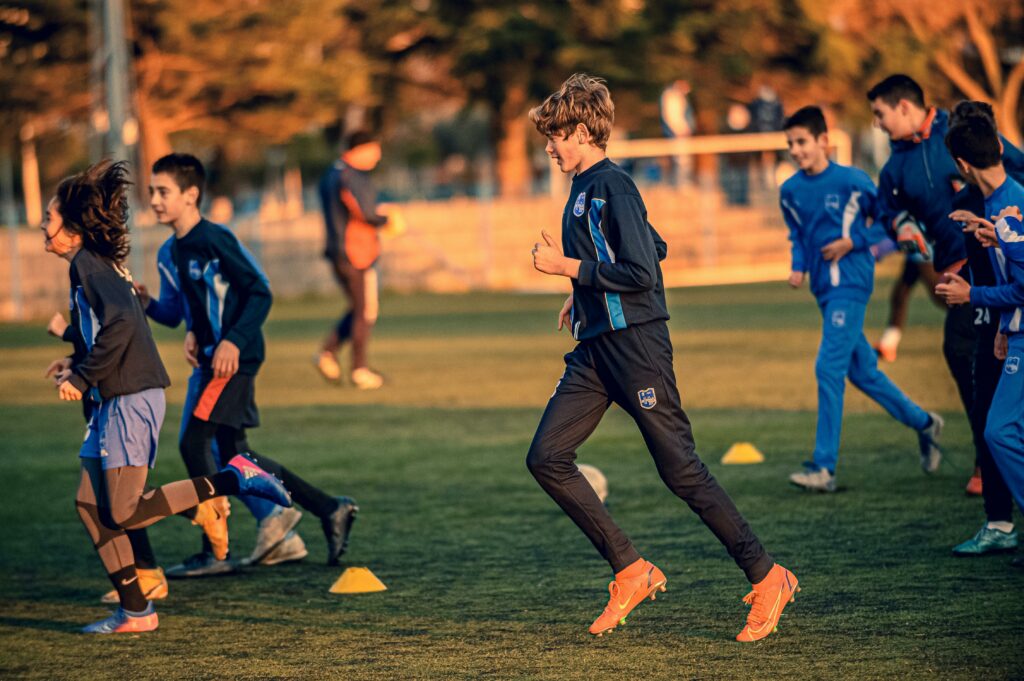In a world where the landscape of education and work is rapidly changing, we need to RETHINK how we prepare our children. How sports can shape young minds for tomorrow and unlock their future by learning differently.
The skills required for success are shifting and the ability to ADAPT, THINK creatively and COLLABORATE is more critical than ever. Enter sports—not just as a physical activity, but as a powerful tool for developing the very skills that will set young minds apart: innovative thinking, complex problem-solving and interpersonal skills.
1. INNOVATIVE THINKING
Sports provide a dynamic environment where these abilities are honed. INNOVATIVE THINKING, the art of approaching challenges in unexpected ways, becomes second nature when young athletes are placed in high-pressure situations. They learn to think on their feet and find innovative solutions, such as a tennis player figuring out how to counter a stronger opponent’s serve. This skill extends beyond the court or field and into real-world scenarios, where creative problem-solving can be the key to success in business or life.
2. COMPLEX PROBLEM-SOLVING
Then there’s complex PROBLEM-SOLVING, a skill athletes practice every time they face STRATEGIC DECISIONS in competition. Whether it’s coordinating plays in basketball or adjusting tactics in a football match, sports require quick thinking, pattern recognition (to observe and identify recurring elements) and strategic planning.
These are the SAME COMPETENCIES that future professionals will need in a world driven by difficult challenges—where solutions are not always straightforward and adaptability is paramount.

3. INTERPERSONAL SKILLS
INTERPERSONAL SKILLS naturally develop through the social dynamics of team sports. Learning to COMMUNICATE effectively, COLLABORATE with teammates and MANAGE EMOTIONS are all essential for future leadership roles.
Coaches are key here—they guide young athletes not only in technical skills but in how to navigate relationships, both on and off the field. This mirrors how future educators and mentors could foster emotional intelligence in classrooms, preparing students for the collaborative environments they will face in their careers.
KIDS NEED TO « LEARN TO LEARN »
But beyond developing these individual skills, sports also teach young athletes how to LEARN TO LEARN, a concept that’s gaining traction in educational psychology. It’s about learning cultivating a GROWTH MINDSET. When athletes fail, they learn to adjust their approach, listen to feedback and improve their performance over time. This is a skill that should be integrated into academic settings as well, teaching students to embrace challenges, persist through setbacks and continuously seek self-improvement. Children should not just focus on acquiring information but also on developing the ability to learn new skills, adapt to new situations and continue improving over time. This concept of learning how to learn is central to fostering a growth mindset, which helps kids become more adaptable and resilient learners, skills that are crucial for both their academic and personal development.
THE BIG PICTURE HERE IS
By incorporating sports into education, we’re not just helping children develop physically—we’re also fostering mental resilience, creativity and emotional intelligence. These are the qualities that will allow them to thrive in a future that demands adaptability and lifelong learning. Whether on the field or in the classroom, the next generation needs mentors—coaches and teachers alike—who can guide them toward their full potential by teaching them not just what to learn but how to learn.
By embracing this approach, we’re not just training better athletes—we’re cultivating future leaders, innovators and thinkers who will thrive in a world that demands both mental agility and emotional resilience.
For further reading on how sports influence critical thinking and emotional development, check out this insightful article on How Sports Boost Youth Development

